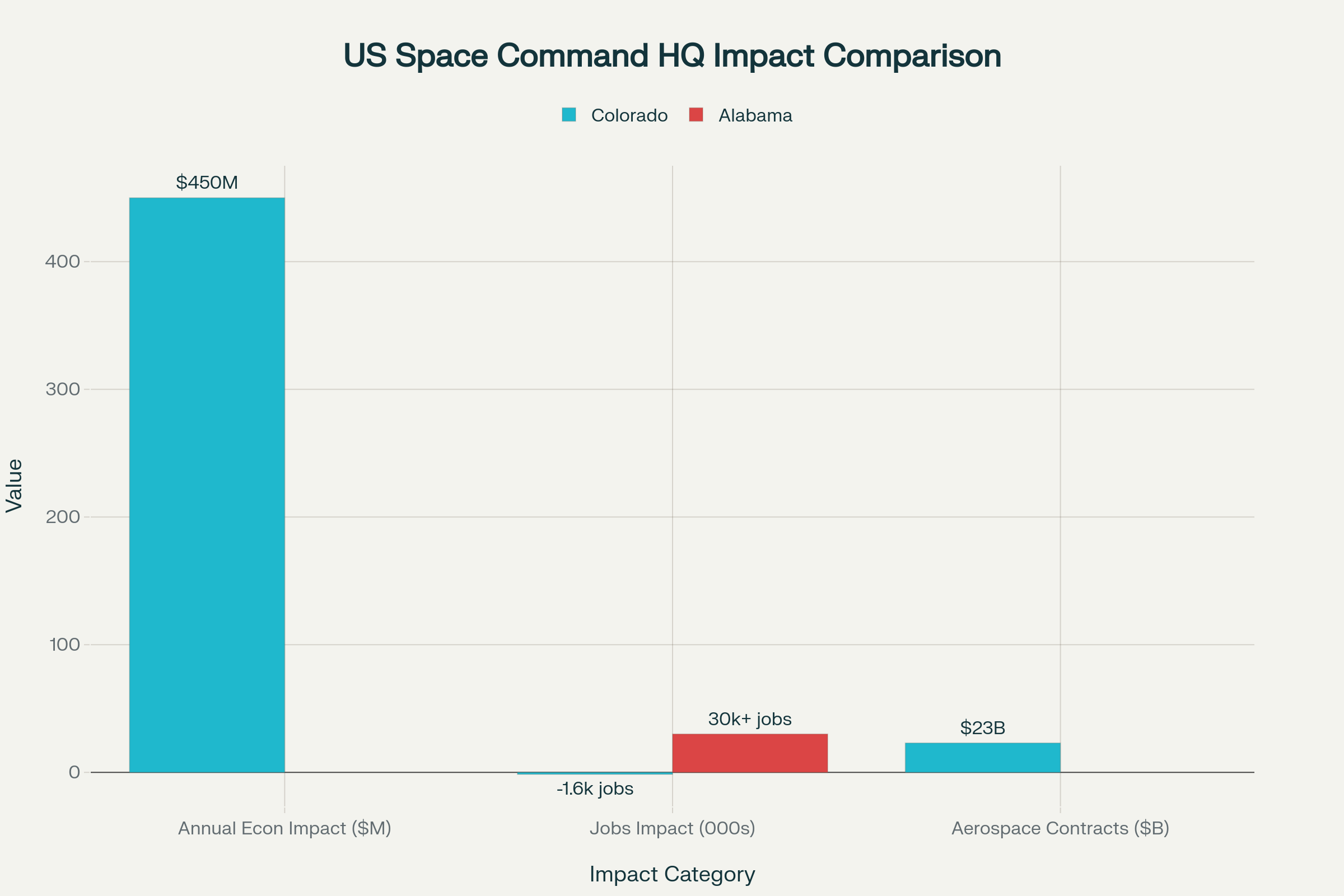Key Highlights
- US Space Command headquarters will move from Colorado Springs to Huntsville, Alabama, affecting 1,700 personnel
- Decision overturns Biden administration’s 2023 choice to maintain operations in Colorado
- Economic impact includes $450 million annually to Colorado economy and potential 30,000 jobs to Alabama
President Donald Trump announced on September 3, 2025, that the US Space Command headquarters will be relocated from Colorado Springs, Colorado, to Huntsville, Alabama, reversing a key decision made by the Biden administration. The US Space Command headquarters relocation represents a significant shift in national space defense strategy and economic investment between the two competing states. Trump stated during the Oval Office announcement, “The US Space Command headquarters will move to the beautiful locale of a place called Huntsville, Alabama, forever to be known from this point forward as Rocket City.” This US Space Command headquarters relocation concludes a multi-year political battle between Alabama and Colorado over securing the prestigious military installation.
Strategic Military Operations and National Security Implications
- Space Command oversees critical military operations beyond Earth’s atmosphere, including satellite protection and missile warning systems
- The command manages approximately 18,000 joint force personnel across seven sub-components
The US Space Command headquarters relocation affects one of America’s most critical military installations responsible for space-based national security operations. According to Congressional Research Service data, approximately 1,700 personnel are directly assigned to Space Command headquarters, while about 18,000 joint force personnel work across the command’s seven sub-components based in six states. The US Space Command headquarters relocation impacts operations including satellite-based navigation, troop communication systems, and missile launch warning capabilities that are essential for national defense.
Space Command’s area of responsibility extends from 62 miles above Earth’s surface to the Moon and beyond, encompassing the Kármán Line that defines the boundary of space. The US Space Command headquarters relocation comes at a time when adversaries including China and Russia are developing offensive space capabilities that threaten US satellites and space infrastructure. Defense Intelligence Agency reports indicate these capabilities range from cyber warfare platforms to ground-based and space-based anti-satellite weapons designed to degrade American space systems.
The timing of the US Space Command headquarters relocation reflects growing concerns about space as an increasingly contested domain. General Stephen Whiting, the current Space Command commander, testified in February 2024 that China and Russia seek to exploit perceived US reliance on space systems through military counterspace capabilities. The US Space Command headquarters relocation positions Alabama’s Huntsville as a strategic hub for addressing these emerging threats.
Economic Impact Analysis and Regional Consequences
- Colorado faces potential loss of $450 million annual economic contribution and 1,400-1,700 jobs
- Alabama expects to gain over 30,000 jobs and hundreds of millions in investment
The US Space Command headquarters relocation carries substantial economic implications for both states involved in this high-stakes competition. Colorado’s aerospace ecosystem currently ranks number one per capita in aerospace employment, with over 2,000 aerospace businesses employing 55,000 people directly and 184,000 indirectly. The state attracted $23 billion in federal aerospace contracts in 2024, with military bases contributing an additional $12.5 billion economic impact and federal labs adding $3.4 billion.

Economic Impact Comparison of US Space Command Headquarters Relocation: Colorado vs Alabama
Colorado officials estimate the US Space Command headquarters relocation will cost the state approximately $450 million annually in direct economic impact. Dr. Tatiana Bailey, an economic expert, noted that Colorado Springs specifically faces the loss of 1,500 to 1,700 jobs, which represents a significant impact for a region that needs 5,000 new jobs annually to match population growth. The US Space Command headquarters relocation may result in up to 1,000 civilian employees choosing not to relocate to Alabama, potentially creating a skilled workforce shortage.
Conversely, Alabama anticipates substantial economic benefits from the US Space Command headquarters relocation. Trump announced during the ceremony that the move will generate “more than 30,000 Alabama jobs” and “hundreds of millions of dollars of investment”. Alabama Representative Dale Strong indicated that constructing a new headquarters would require approximately 14 to 18 months, providing immediate construction employment opportunities. The US Space Command headquarters relocation positions Huntsville to leverage its existing aerospace infrastructure, including the Army’s Redstone Arsenal and NASA’s Marshall Space Flight Center.
The broader economic analysis reveals that Colorado’s aerospace industry generated over $40 billion in federal investment in 2024, suggesting the state’s economy can absorb the US Space Command headquarters relocation impact over time. However, the immediate regional effects on Colorado Springs will be more pronounced, particularly affecting the local defense contractor ecosystem and military-adjacent businesses.
Political Motivations and Interstate Competition
- Trump cited Colorado’s mail-in voting system as a factor in his decision-making process
- Alabama lawmakers propose naming the facility the “Donald J. Trump Space Command Center”
The US Space Command headquarters relocation decision reflects significant political considerations beyond military strategic planning. Trump explicitly acknowledged that Colorado’s mail-in voting system played “a big factor” in his decision to relocate the command, stating, “The problem I have with Colorado, one of the big problems, they do mail-in voting … so they have automatically crooked elections”. This US Space Command headquarters relocation rationale drew criticism from Colorado officials who noted that multiple audits and investigations have confirmed the accuracy and security of Colorado’s electoral system.
The political dimensions of the US Space Command headquarters relocation became evident during the announcement ceremony, where Alabama lawmakers praised Trump’s decision. Senator Tommy Tuberville suggested the facility be named the “Donald J. Trump Space Command Center in Huntsville, Alabama”. Alabama Senator Katie Britt expressed gratitude to Trump for “returning Space Command to its rightful home,” emphasizing the political relationship between the state and the Trump administration.
Colorado’s bipartisan congressional delegation responded strongly against the US Space Command headquarters relocation, issuing a joint statement that the move “will set back our space defense apparatus back years, waste billions of taxpayer dollars, and hand the advantage to the converging threats of China, Russia, Iran, and North Korea”. Democratic Governor Jared Polis called the decision “disappointing and wrong,” arguing it would diminish military readiness and national security.
The US Space Command headquarters relocation reverses the Biden administration’s 2023 decision to maintain the command in Colorado Springs after a comprehensive review process. Biden’s decision was based on concerns that relocating the command could put military readiness at risk, among other operational factors. The back-and-forth nature of the US Space Command headquarters relocation across different administrations highlights how national security decisions have become intertwined with political considerations.
Implementation Timeline and Future Challenges
- Construction of new Alabama facilities expected to take 14-18 months
- Transition may face workforce retention challenges as civilian employees may choose not to relocate
The US Space Command headquarters relocation implementation faces several logistical and operational challenges that could affect the timeline and effectiveness of the move. Alabama Representative Dale Strong estimated that constructing new headquarters facilities would require approximately 14 to 18 months, suggesting the US Space Command headquarters relocation will not occur immediately. This timeline allows Space Command to maintain current operations while Alabama develops the necessary infrastructure to support the military installation.
One of the most significant challenges facing the US Space Command headquarters relocation involves workforce retention and recruitment. Defense Department Inspector General reports have highlighted concerns that up to 1,000 civilian employees might choose not to relocate from Colorado to Alabama. The US Space Command headquarters relocation could create a skills gap if experienced personnel decide to remain in Colorado’s established aerospace ecosystem rather than move to Alabama.
The US Space Command headquarters relocation also raises questions about operational continuity during the transition period. Space Command achieved full operational capability in Colorado Springs in late 2023, after operating from Peterson Space Force Base since Trump revived the command in 2019. The US Space Command headquarters relocation risks disrupting established operational procedures and institutional knowledge that personnel have developed over several years of Colorado-based operations.
Colorado officials have indicated they will take legal and legislative action to challenge the US Space Command headquarters relocation. Colorado Attorney General Phil Weiser stated his office “has been preparing” for such a decision and expressed readiness to “challenge it in court”. The US Space Command headquarters relocation may face Congressional opposition, as Section 2889 of the FY2024 National Defense Authorization Act previously limited funding for headquarters construction pending additional reviews.
Alabama’s preparation for the US Space Command headquarters relocation benefits from existing aerospace infrastructure in Huntsville, known as “Rocket City” for its historical contributions to the US space program. The city hosts the Army’s Redstone Arsenal, NASA’s Marshall Space Flight Center, and the Army Space and Defense Command. This existing infrastructure provides a foundation for the US Space Command headquarters relocation, though significant additional construction and facility development will be required to accommodate the command’s specific operational needs.
Closing Assessment
The US Space Command headquarters relocation from Colorado to Alabama represents more than a simple change of geographic location, it embodies a complex intersection of national security priorities, economic interests, and political calculations. While Trump framed the decision as restoring his original plan that was “wrongfully obstructed by the Biden administration,” the US Space Command headquarters relocation raises legitimate questions about prioritizing political loyalty over operational readiness and established military capabilities.
The economic consequences of the US Space Command headquarters relocation will ripple through both states for years to come, with Colorado facing the immediate loss of hundreds of high-paying jobs and substantial federal investment, while Alabama anticipates significant economic growth and job creation. However, the true test of this US Space Command headquarters relocation will be whether it enhances or diminishes America’s space defense capabilities at a time when adversaries are rapidly advancing their own counterspace programs. The success of this controversial decision will ultimately be measured not in political victories or economic gains, but in the command’s ability to maintain America’s strategic advantage in the increasingly contested domain of space.


